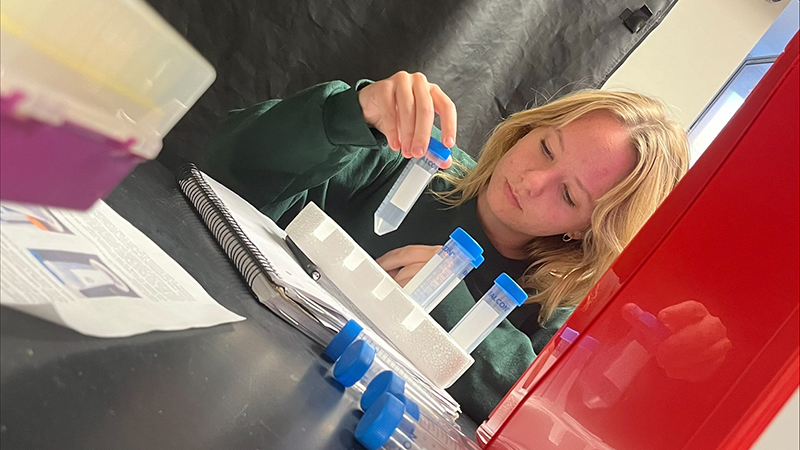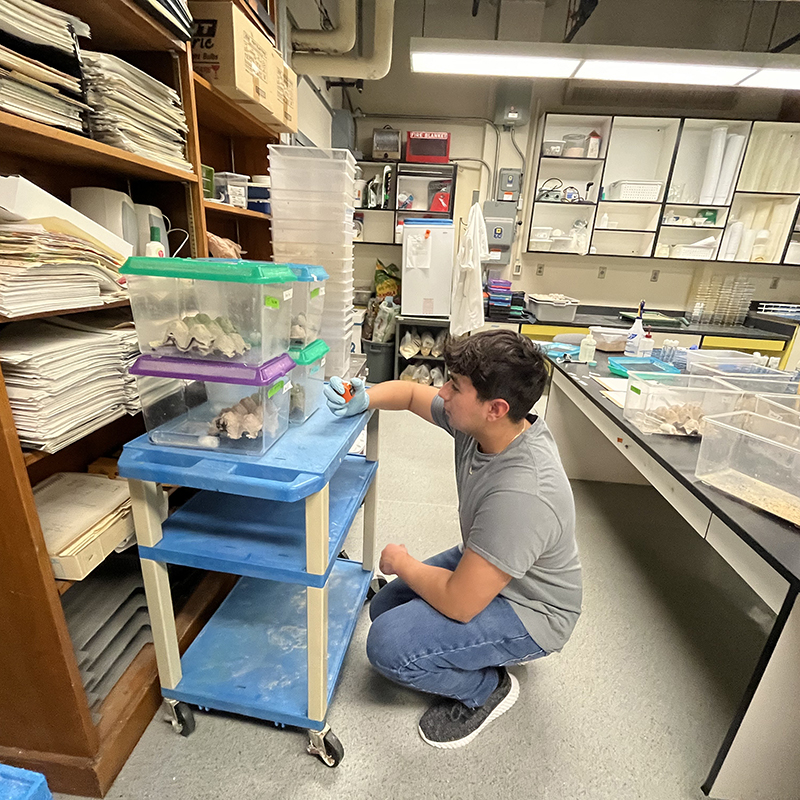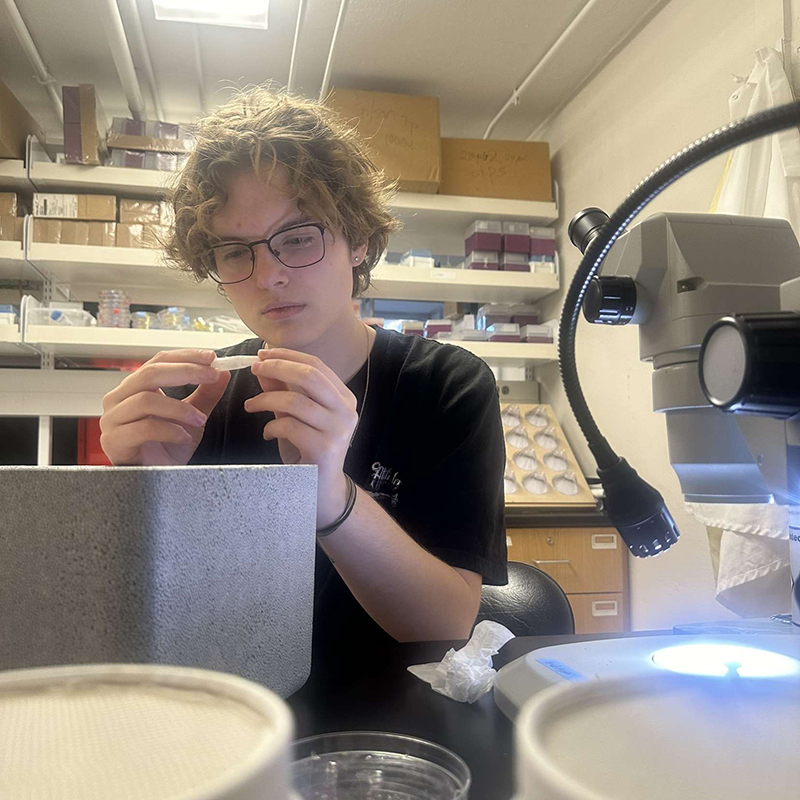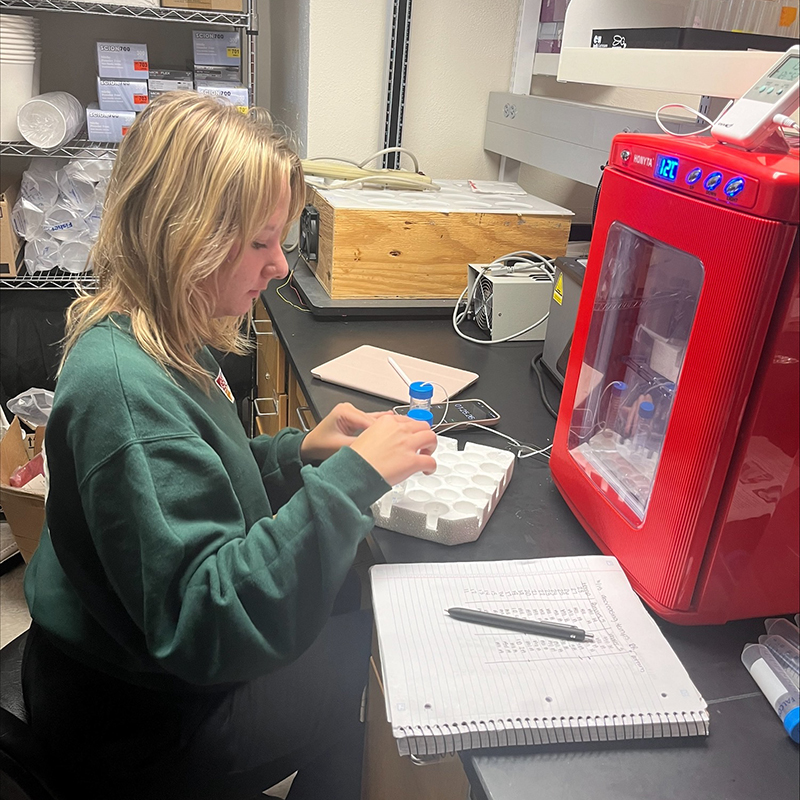Posted: 11/21/2024
Three SNR freshmen doing first-year research

By Ronica Stromberg
Three freshmen with double majors in the School of Natural Resources are doing insect research through the First Year Research Experience program at Nebraska. Bryan Anguiano-Rivera is studying monarch butterflies with Kristi Montooth, a School of Biological Sciences professor. Oliver Gray and Kayley Kubela are studying mosquitoes with Leslie Rault, an entomology professor.
Bryan Anguiano-Rivera
Growing up in Omaha, Anguiano-Rivera knew about dwindling populations of monarch butterflies and about the use of salt on Nebraska roads in the winter. In the project led by Montooth, he is looking at the possibility that salt could be affecting butterflies that feed on milkweed plants in ditches.
To investigate the effect of increased sodium on the butterflies, the two researchers have continued an experiment started by other researchers with two groups of lab-reared monarchs. One group was fed milkweed in normal conditions as caterpillars. The other group was fed milkweed grown with higher concentrations of salt. After the caterpillars metamorphosed into butterflies, researchers measured their development, wing size, weight and metabolic rate.

Now, Anguiano-Rivera and Montooth are measuring how the salt may affect energy stores like sugars and fats that can affect butterfly success during migration. They are still gathering data, and Anguiano-Rivera has until May to either wrap up the project or possibly continue it as a UCARE researcher.
He is on a pre-vet path and said he had done clinical work before but wanted to explore research work more to figure out where his interests truly lie. The fisheries and wildlife major had worked as a high schooler at Omaha's Henry Doorly Zoo and Aquarium in the insect department, had studied gentoo penguins as a science fair project and had planted a pollinator garden with other high schoolers.
He is also considering education as a possible part of his career path.
"I think it's interesting, because just being able to show people how the world works and why, because a lot of people just don't know about pollinators and why they're important, which could obviously be a problem if we are so reliant on them," he said.
Oliver Gray
Originally from Seward, Gray is also a fisheries and wildlife major interested in pre-veterinary medicine. He is studying how genes are expressed in the body parts of mosquitoes, possibly advancing understanding of how mosquitoes spread disease and build resistance to pesticides.
Only female mosquitoes drink blood, which they need for egg production, so they are the ones transmitting diseases. Gray dissects them under a microscope to look at how their genes behave differently in separate body parts.

He said he loves focusing on less-loved animals in his research because those are the ones he loves the most.
"Obviously, mosquitoes aren’t great, but they do help us a lot, and we don't want to kill them all," he said. "So, that's kind of the main thing that I tell people is, 'You can hate mosquitoes all you want, but they do so much good.'"
Mosquitoes serve as test subjects in research on disease transmission and as food for many species of birds, dragonflies and spiders. Some frogs, toads and fish eat mosquito larvae and pupae, and mosquitoes contribute to pollination.
Gray said he hopes to use what he has learned working with insects in future work in herpetology, preferably dealing with snakes. He has as pets a carpet python, two ball pythons, a rat snake, a California kingsnake and a Hog Island boa. Where and how he might work with snakes in the future is still uncertain, but Gray said he has enjoyed doing research, especially working hands-on in the lab.
"It's so different than anything I've ever done, and it's so much fun," he said. "Maybe pipetting for like an hour straight doesn't sound fun for other people, but I love it. I could do it all day.
Kayley Kubela
A fisheries and wildlife major from Papillion, Kubela is looking at the effect of temperature on mosquitoes from different colonies. She aims to see whether increased temperatures from climate change could make the mosquitoes’ genes more resistant to pesticides. The answers she finds could have implications for pesticides and their use going forward.
"If we find out there isn't a change, that's still better than having no information on it," she said.
She and her advisor, Rault, are using the polymerase chain reaction method to create enough copies of mosquito DNA to run tests on. They plan to use a method called gel electrophoresis to separate and take pictures of DNA bands and also analyze changes in genes helping with temperature changes.

"I've really been excited actually working in the lab and doing those kinds of procedures like the PCR and the gel electrophoresis, because those are all things I'd heard about, but it's really exciting being able to do them," Kubela said.
She had taken advanced placement biology in high school and had learned about the procedures but did not get the experience of performing them. Looking into colleges, she sought ones that offered research experiences and chose Nebraska and the FYRE program.
"When I saw this opportunity, I thought it'd be really cool to expand my horizons, see what I don't like, see what I do like," she said. "In the future, I really want to be a wildlife biologist.”
All three students gained acceptance into the FYRE program after filling out the FAFSA and qualifying for work-study.